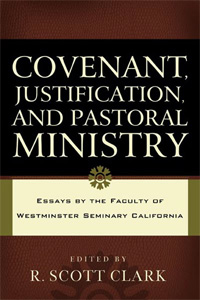Edited by and some translations by R. Scott Clark On Law and Gospel On the Covenant of Redemption (pactum salutis) On the Covenant of Works (foedus operum) On the Covenant of Grace (foedus gratiae) On Justification On Union with Christ On the . . . Continue reading →
covenant of works
In By Grace, Stay in By Faithfulness? (2)
In the first part we quickly introduced the basic doctrine of covenant nomism, namely that God has established a system whereby sinners are admitted to the covenant by grace and they stay in or they retain that status or they retain the . . . Continue reading →
In By Grace, Stay in By Faithfulness? (3)
Part 2 Why is [Covenant] Nomism So Attractive? No one but God knows what’s is in the hearts of other people, so I’m not judging or speaking to personal intentions. We can, however, look at the history of Christian theology and draw . . . Continue reading →
Perkins on the Two Covenants in Gal 4:24-25
(HT: Particular Voices) The two testaments are the Covenant of works and the Covenant of grace, one promising life eternal to him that does all things contained in the law; the other to him turns and believes in Christ. And it must . . . Continue reading →
Jeremiah Burroughs On The Spiritual Value Of Distinguishing Between The Covenants Of Works And Grace
The doubts and fears of most Christians arise from hence because they have not a clear understanding of the difference between the covenant of grace and the covenant of works. There is nothing in the world would so satisfy the consciences of . . . Continue reading →
The Covenant Of Creation Was A Covenant Of Law
At the beginning of the human race that old serpent led humanity away from the word of the law, and thus from the covenant of creation by a false interpretation. . . . The summary of this law shining forth in the . . . Continue reading →
The Sacraments Of The Covenant Of Works
I. God made a double covenant with man, the one of works and the other of grace; the former before, the latter after the fall. II. The covenant of works was confirmed by a double sacrament, to wit, the Tree of Life, . . . Continue reading →
He Was To Repeat That Covenant Of Works With Israel
The covenant of works, which may also be called a legal or natural covenant, is founded in nature, which by creation was pure and holy, and in the law of God, which in the first creation was engraven in man’s heart. For . . . Continue reading →
Ames On Substantial Identity Of The Moral Law With The Decalogue
9. From this speciall and proper way of governing reasonable Creatures, there ariseth that covenant, which is between God and them. For this covenant is as it were a certaine transaction of God with the Creature, whereby God commandeth, promiseth, threatneth, fulfilleth, . . . Continue reading →
Office Hours—Sacred Bond: Covenant Theology Explored
Too often, the way covenant theology is presented, it seems too complicated to understand or explain to others. It doesn’t have to be that way and it isn’t in this interview with Zach Keele and Mike Brown, authors of a new introduction . . . Continue reading →
Robert Shaw On Republication In The Westminster Confession
It may be remarked that the law of the ten commandments was promulgated to Israel from Sinai in the form of a covenant of works. Not that it was the design of God to renew a covenant of works with Israel or . . . Continue reading →
The Legal Principle In Moses
The Mosaic law itself did not originate the notion of personal obedience de novo, since it recapitulated a more fundamental creational principle of righteousness through obedience to the Creator’s covenant stipulations. Further, the Mosaic law did not introduce a new way of . . . Continue reading →
CJPM Now Available as an E-Book
Finals and the Covenant of Works
It’s the season for final exams at Westminster Seminary California. I always get a little nervous during a final, even though I’m the one giving it and not the one taking it. Naturally I want the students to do well but by the . . . Continue reading →
Olevianus On Moses As A Legal Covenant
For the [Mosiac] covenant was a legal covenant solemnly agreed, by which the people were obligated to present, by their own strength, perfect obedience to the Law (Matthew 22). Since the Law is the eternal rule of righteousness in the divine mind . . . Continue reading →
Witsius On Merit
I.I.XV. In the covenant of works, man is considered as working, and the reward to be given as of debt; and therefore man’s glorying is not excluded, but he may glory as a faithful servant may do upon the right discharge of . . . Continue reading →
More Questions From Ginger: Why Is Republication So Controversial?
As a follow-on to the post on the covenant of works, Ginger asks, You said: “Several have said that their status as a national people and their tenure in the land was affected by their obedience or disobedience. This view, however, has . . . Continue reading →
The History Of Covenant Theology
Until recently, it was widely held that covenant theology was created in the middle of the seventeenth century by theologians such as Johannes Cocceius (1609–1669). In fact, covenant theology is nothing more or less than the theology of the Bible. It is . . . Continue reading →
Is Republication Really That Confusing?
A pastor writing a Q&A column in a small Canadian religious newspaper answered a question about republication recently by writing “as a general rule, Reformed Christians agree that the Covenant of Works was established at the start with Adam, and with all . . . Continue reading →
Heidelcast 46: Conditions And The Covenant Of Grace (Pt 1)
In Reformed theology we speak of three covenants, the pre-temporal covenant of redemption, the covenant of works, and the covenant of grace. In the covenant of redemption there are two aspects, works for the Son and grace for the elect. The Son was . . . Continue reading →









